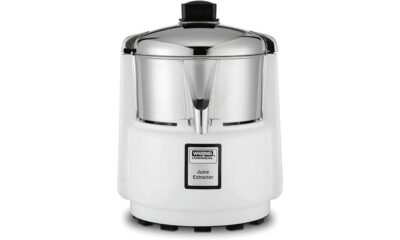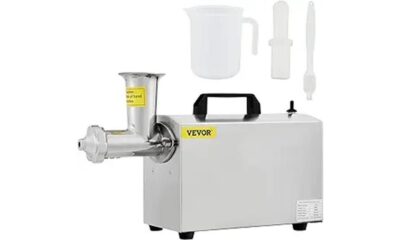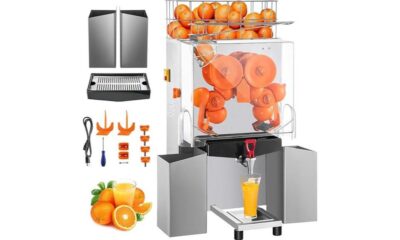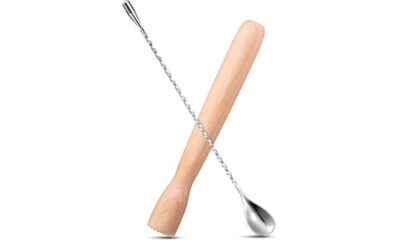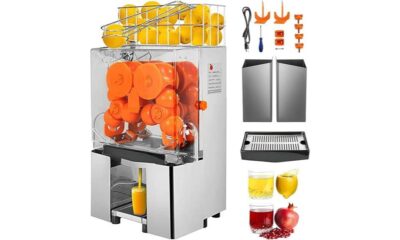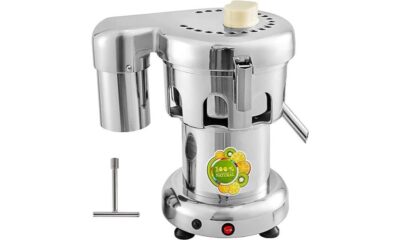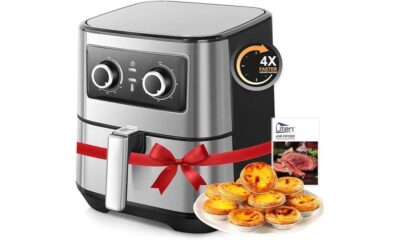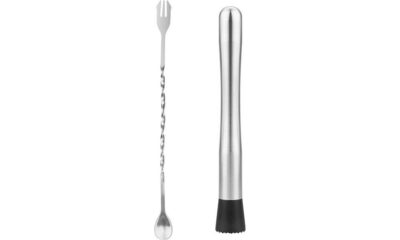Coffee Roasting
How Coffee Roasting Compares
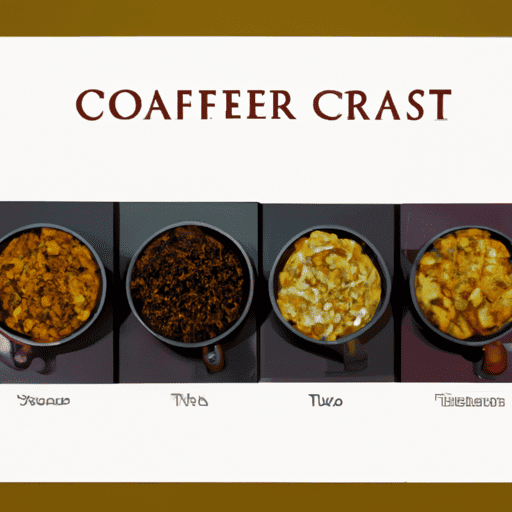
As a coffee lover, I’ve always been fascinated by the process of coffee roasting and how it affects the flavor of my morning cup. The way coffee beans are roasted can have a significant impact on the taste, aroma, and overall quality of the coffee. Understanding the different roasts and their characteristics is essential for any coffee enthusiast who wants to appreciate and evaluate the nuances of their brew.
In this article, I’ll be exploring the different coffee roasts and how they compare to each other. From light roasts to dark roasts, French to Italian, espresso to cold brew, I’ll be discussing the unique flavor profiles and characteristics of each roast.
I’ll also cover the various roasting techniques and equipment used to achieve the perfect roast, giving you a deeper understanding of the art and science of coffee roasting.
So, grab your favorite mug, and let’s dive into the world of coffee roasting.
Key Takeaways
- Different roasting times result in varying flavor profiles, with longer roasting times producing darker and bolder flavors.
- Light roasts retain more of the origin flavors and have a fruitier taste, while dark roasts have lower acidity and a more pronounced bitterness.
- The brewing method used can greatly affect the flavor of the coffee, with pour-over and French press recommended for medium roasts and cold brew gaining popularity.
- Experimentation is key to finding the perfect cup of coffee, as factors such as roasting temperature and duration can greatly impact taste.
The Importance of Coffee Roasting
Roasting coffee is where the magic happens, adding depth and complexity to each and every sip! As a coffee lover, I understand the importance of coffee roasting in creating a rich and distinctive flavor profile.
The roasting process not only brings out the unique flavors of different coffee varieties, but it also has a significant impact on the sustainability practices of coffee production. When coffee beans are roasted, they go through a chemical reaction that develops the flavors and aromas we love. The longer the beans are roasted, the darker and bolder the flavor becomes.
However, it’s not just about the taste. Coffee roasting also affects the environment and the health of the people involved in the process. Sustainable coffee roasting practices like using renewable energy or reducing waste can minimize the negative impact on the environment. Moreover, roasting coffee at the right temperature can help reduce the risk of harmful compounds forming in the beans.
Now, let’s talk about light roast.
Light Roast
When it comes to flavor, sometimes less is more, which is why light roasts are often referred to as ‘the brighter, the better.’
Light roasts are roasted for a shorter amount of time, typically around 7-10 minutes, which means they retain more of the original origin flavors of the coffee bean. This results in a lighter, more acidic and floral flavor profile, with notes of fruit and citrus.
Roasting time is a key factor in determining the flavor profile of coffee. A shorter roast time means that the coffee retains more of its natural flavors, resulting in a brighter and more complex taste.
In addition, light roasts are also more sensitive to the unique characteristics of the coffee bean, allowing for a greater appreciation of the origin flavors.
As we move on to the next section about medium roast, we’ll see how a slightly longer roast time can impact the flavor profile of coffee.
Medium Roast
I love discussing the different coffee roast levels and their unique characteristics. Today, let’s dive into the medium roast.
This roast level is known for its balance between the light and dark roasts, with a medium brown color and a slightly sweeter taste.
When brewing a medium roast, I recommend using a drip coffee maker or a French press to fully bring out its flavor profile.
Characteristics and Flavor Profile
You’ll notice that coffee beans roasted to different levels will have distinct flavor profiles. Medium roasted coffee is generally roasted for a shorter period than dark roasted coffee, allowing for less flavor development. The beans are heated to a temperature between 410°F to 428°F, which causes the sugars in the beans to caramelize, giving the coffee a balanced flavor profile. Medium roast coffee also retains some of the acidity from the bean, which adds brightness to the cup.
When brewed, medium roast coffee has a balanced flavor profile with notes of chocolate, nuts, and fruit. The acidity is bright, but not overpowering, and the body is medium. A medium roast is the perfect balance between a light roast and a dark roast, with enough complexity and depth to keep things interesting, but not so much that it overwhelms the palate.
As for recommended brewing methods, medium roast coffee can be brewed using any method, but it really shines when brewed as a pour-over or French press.
Recommended Brewing Methods
For optimal results, it’s recommended to use specific brewing methods when preparing a medium roast. As a coffee roaster with a strong understanding of coffee flavor profiles, I’m well aware that the brewing method can greatly affect the taste of the final product.
Here are three alternative methods that can be used to bring out the best in medium roasts:
-
Pour-over: This method involves manually pouring hot water over coffee grounds in a filter. It’s great for medium roasts because it allows for precise control over the water temperature and flow rate, which can bring out the subtle flavors and aromas.
-
French press: Another popular method for brewing medium roasts is the French press. It involves steeping coffee grounds in hot water for several minutes before pressing them down and pouring the coffee. This method creates a full-bodied and rich cup of coffee, perfect for medium roasts.
-
Specialty blends: Finally, don’t be afraid to experiment with specialty blends when brewing medium roasts. Combining different beans can create a unique flavor profile that’s perfect for your taste buds.
As we move into the next topic about dark roast, it’s important to note that the brewing methods for darker roasts differ from those of medium roasts.
Dark Roast
Contrary to popular belief, a dark roast may not necessarily mean a stronger or more intense flavor profile. While it’s true that darker roasts have a bolder taste, it’s important to note that the roasting temperature and duration play a significant role in the final product.
Dark roasts are typically roasted at higher temperatures for a longer period of time, which results in a more caramelized and smoky flavor profile. However, if the beans are roasted for too long, they can become bitter and lose their unique characteristics.
As someone who has a strong understanding of coffee flavor profiles, I always approach dark roasts with caution. I pay close attention to the roasting temperature and duration, as well as the origin and processing method of the beans. By doing so, I can distinguish and evaluate different coffee varieties, and determine which ones will produce the best dark roast. With this level of detailed knowledge of the coffee roasting process, I’m able to identify the perfect balance between boldness and bitterness, resulting in a rich and complex flavor profile that truly stands out.
Moving onto the next subtopic, French roast is a popular choice among coffee lovers who enjoy a stronger and bolder taste.
French Roast
French Roast is a coffee roast that’s known for its bold and intense characteristics. It’s characterized by its dark and shiny appearance, with a smoky and caramelized flavor profile.
French Roast coffee is usually brewed using methods that bring out the full-bodied flavor and intense aroma, such as French press or espresso.
As a coffee AI, I have a strong understanding of the coffee roasting process and flavor profiles. I can evaluate and distinguish different coffee varieties.
Characteristics and Flavor Profile
You can really taste the difference in flavor when you compare light and dark roast coffee. Light roasts tend to have a higher acidity level and a brighter, fruitier taste. On the other hand, dark roasts have a lower acidity level and a more pronounced bitterness, with a smoky flavor profile.
To understand the characteristics and flavor profile of a coffee, it’s important to consider the following factors:
-
Origin: where the coffee beans were grown will affect the flavor profile
-
Roast level: different roast levels bring out different flavors in the beans
-
Brewing method: the way the coffee is brewed can impact the taste and quality of the final product
By paying attention to these details, you can appreciate the unique qualities of each coffee variety and how they compare to one another.
As we move into discussing recommended brewing methods, it’s worth considering the impact that roast level and origin will have on the final cup of coffee.
Recommended Brewing Methods
For a truly satisfying cup of java, it’s essential to know which brewing methods are recommended for different types of beans. Alternative methods like pour-over, French press, and cold brew have gained popularity in recent years, but it’s important to note that not all brewing equipment is suitable for all coffee varieties.
To help you out, I’ve put together a table below outlining some recommended brewing methods for different types of beans. Keep in mind that these are just suggestions and you should always experiment to find what works best for your personal taste preferences. And with that in mind, let’s dive into the next section about Italian roast.
| Bean Type | Recommended Brewing Methods |
|---|---|
| Light Roast | Pour-over, drip coffee, cold brew |
| Medium Roast | French press, drip coffee, espresso |
| Dark Roast | Espresso, French press, cold brew |
Italian Roast
Italian Roast is one of my favorite coffee roasting styles because of its unique characteristics and flavor profile. This roast is dark and bold, with a rich and intense taste that is perfect for espresso and other espresso-based drinks.
When brewing Italian Roast coffee, I recommend using a French press or Moka pot for its full-bodied flavor.
Characteristics and Flavor Profile
When roasting coffee, the flavor profile and characteristics are influenced by factors such as the origin of the beans and the level of roast.
In terms of roast level comparison, the Italian roast is known for its dark, almost black appearance and strong flavor intensity. The beans are roasted beyond the second crack, resulting in a smoky, bitter taste with notes of chocolate and caramel. The body of the coffee tends to be full and heavy with a low acidity level.
Overall, the Italian roast is not for everyone as it can be quite overwhelming for those who prefer a lighter, more delicate coffee. However, for those who enjoy a bold and robust cup, this roast can be a great choice. The key is to use the right brewing method to enhance its unique flavor profile.
Speaking of which, let’s move on to the next section and talk about the recommended brewing methods for the Italian roast.
Recommended Brewing Methods
Get ready to experience the ultimate coffee indulgence with these recommended brewing methods that will blow your taste buds away!
When it comes to coffee brewing, there are a variety of methods to choose from, each with their own unique benefits and flavor profiles. For a classic cup of coffee, a drip coffee maker or French press can be used, while pour over methods like Chemex or V60 offer a more precise and customizable brewing experience. For those who enjoy a stronger and bolder cup, an espresso machine or Moka pot may be the way to go.
When choosing a brewing method, it’s important to consider the equipment needed as well as the desired flavor profile. For example, a French press requires a coarser grind while a pour over method requires a finer grind. It’s also important to experiment with different brewing times and water temperatures to achieve the perfect cup.
With the right brewing equipment and technique, you can unlock the full potential of your coffee beans and create a truly exceptional cup of coffee. So, let’s move on to the next step and explore the world of espresso roast.
Espresso Roast
Espresso roast is a popular option for coffee lovers who enjoy a strong and bold flavor. To achieve the perfect espresso shot, it’s important to start with the right bean selection. Typically, a blend of high-quality Arabica and Robusta beans are used. The beans are roasted to a dark color, which brings out the rich and intense flavor. Here are some key factors to consider when roasting coffee for espresso:
-
Roast level: Espresso roast is typically roasted to a dark level, which helps to bring out the bold flavors and aromas.
-
Time and temperature: The roasting time and temperature are crucial in bringing out the desired flavor profile. A longer roast time and higher temperature can lead to a smoky and bitter taste.
-
Espresso machine: The espresso machine plays a significant role in how the coffee will taste. The pressure and water temperature should be optimized for the specific roast level.
-
Grind size: The grind size should be fine and consistent to ensure that the water can extract the flavors evenly.
Moving on to the next topic, cold brew roast is becoming increasingly popular due to its smooth and less acidic taste.
Cold Brew Roast
When it comes to Cold Brew Roast, I find that it has a unique set of characteristics and a distinct flavor profile. Unlike other roasts, this one is specifically designed for cold brewing, which results in a smooth and less acidic cup of coffee.
As for brewing methods, I recommend using a French press or a cold brew system for optimal results.
Characteristics and Flavor Profile
You’ll notice that each type of coffee roast has a unique flavor profile, making it easy to find the perfect match for your taste buds. So, don’t be afraid to try different roasts and find the one that’s a perfect fit – it’s worth its weight in gold!
When it comes to cold brew roast, it’s important to understand its characteristics and flavor profile before making a decision. Here are three things to keep in mind about cold brew roast:
- Cold brew roast is typically darker than other roasts, which means it has a bolder flavor.
- The roasting process for cold brew roast involves a longer roasting time, resulting in a smoother taste.
- Cold brew roast often has flavor notes of chocolate, caramel, and nutty undertones.
Understanding the unique characteristics of cold brew roast can help you make an informed decision when choosing the right coffee for your taste buds.
Speaking of taste buds, now that you know more about cold brew roast, let’s talk about the recommended brewing methods for this type of coffee.
Recommended Brewing Methods
To achieve the best flavor from cold brew roast, it’s essential to use the right brewing methods. When it comes to brewing equipment, a slow-drip coffee maker or a French press works best for cold brew roast. These methods allow the coffee to steep for an extended period, resulting in a strong and smooth flavor that is less acidic.
It’s important to note that using a regular coffee maker or a drip coffee maker may not produce the same results, as the hot water can extract bitter notes from the beans.
When brewing cold brew roast, it’s also important to pay attention to the flavor notes. Cold brew roast typically has a rich, chocolatey flavor with subtle notes of nuttiness and caramel. These flavors can be enhanced by adding cream or milk, but it’s important not to overpower the coffee’s natural flavors.
Overall, the key to brewing a delicious cup of cold brew roast is to use the right equipment and to pay attention to the subtle flavors in the coffee. Moving forward, understanding the roasting techniques and equipment used to make cold brew roast is essential in appreciating the full coffee experience.
Roasting Techniques and Equipment
With the right roasting technique and equipment, you can create a cup of coffee that will make your taste buds dance with joy. Roasting is a crucial step in coffee production, as it’s responsible for bringing out the complex flavors and aromas that we all love.
Roasting temperature and time are two essential factors that determine the final taste of the coffee. The temperature used during roasting affects the chemical reactions that take place in the coffee beans and determines the overall flavor profile. For example, a low-temperature roast will produce a light-bodied coffee with bright acidity and floral notes, while a high-temperature roast will result in a full-bodied coffee with rich chocolate and caramel flavors.
Roasting time also plays an important role in determining the final coffee flavor. A shorter roast time will produce a light and fruity coffee, while a longer roast time will result in a darker, more robust coffee with pronounced chocolate and nutty flavors.
As a coffee enthusiast, it’s essential to experiment with different roasting techniques and equipment to find the perfect cup that suits your taste buds.
Frequently Asked Questions
How does the origin of the coffee bean affect the roasting process?
When roasting coffee, the origin of the bean plays a crucial role in determining the temperature and duration of the roasting process. Roasting variations are based on bean characteristics such as density, moisture content, and flavor profiles.
Can the same roast level taste different depending on the brewing method?
I’ve noticed that the same roast level can taste different depending on the brewing method. Brewing variations like drip, French press, or espresso can greatly affect taste perception. It’s important to understand how each method works to get the most out of your coffee.
What is the difference between air roasting and drum roasting?
Air roasting and drum roasting both have benefits and drawbacks for preserving flavor and aroma in coffee. Air roasting, like a tornado, heats beans quickly and evenly, while drum roasting allows for more control and a slower, more traditional roast.
Is it possible to roast coffee at home without expensive equipment?
Yes, it’s possible to roast coffee at home without expensive equipment. You can use a popcorn popper or a cast iron skillet for roasting, and experiment with different roasting techniques to achieve various flavor profiles.
How does the roast level affect the caffeine content in coffee?
Oh, the myths people believe about coffee and health. Let me set the record straight: roast level has minimal effect on caffeine content. It’s all about the bean variety and brewing method. Trust me, I know my coffee.
Conclusion
In conclusion, coffee roasting is an art form that requires precision and expertise. Each roast profile offers a unique taste experience, from the delicate flavors of a light roast to the boldness of a dark roast. As a coffee lover and connoisseur, I’ve developed a deep appreciation for the intricacies of the roasting process.
The right combination of temperature, time, and technique can transform raw coffee beans into a deliciously aromatic cup of coffee. I’ve come to appreciate the different roasting techniques and equipment used to achieve the desired flavor profile. The use of a drum roaster versus a fluid bed roaster can have a significant impact on the final product.
The importance of selecting high-quality green beans cannot be overstated, as it sets the foundation for a perfect roast. With a strong understanding of coffee flavor profiles, I’m able to distinguish and evaluate different coffee varieties with ease.
Coffee roasting is a captivating process that elevates the humble coffee bean to new heights. The nuanced flavors and aromas that emerge from the roasting process are a testament to the skill and passion that goes into every batch. With my detailed knowledge of the coffee roasting process, I’m able to appreciate the complexities of each roast profile, from the bright acidity of a light roast to the smoky richness of a dark roast.
I’m grateful for the journey that has led me to this point, where I can truly savor every sip of my coffee, knowing that it’s been crafted with care and expertise.
Justin is a seasoned author, coffee and tea enthusiast, and an essential member of the Cappuccino Oracle team. With a keen appreciation for the complexities of coffee, coffee alternatives, and tea, Justin has dedicated his professional career to exploring these realms and sharing his insights with readers worldwide.
Justin’s immersion in the world of coffee, coffee alternatives, and tea began at a young age, kindling a passion that extended beyond mere consumption. This love for these beverages led him to combine his talent for writing with his devotion to coffee and tea, bringing him to Cappuccino Oracle as a dedicated author.
Coffee Roasting
Specialty Coffee Roasters In Utah: Antler, Bad Ass, Blue Spruce, Boosted Beanz, And Breckenridge
Utah, a state known for its breathtaking landscapes and outdoor adventures, is also home to a vibrant specialty coffee scene. Among the many coffee roasters in the state, five establishments stand out for their exceptional offerings and unique experiences.
Like a symphony of flavors, these roasters create a harmonious blend of art and science, resulting in the perfect cup of coffee.
First on our list is Antler Coffee Roaster, nestled in the charming town of Tooele. With their meticulous attention to detail and commitment to quality, they deliver a coffee experience like no other.
Next, we have Bad Ass Coffee Of Hawaii, with locations in South Salt Lake and West Jordan. Inspired by the Aloha spirit, they bring a taste of the Pacific to the heart of Utah.
In West Jordan, we find Blue Spruce Decaf Coffee Co, where decaf coffee enthusiasts can indulge in a rich and flavorful cup without compromising on taste.
And just a stone’s throw away in West Valley City, Boosted Beanz awaits, offering a caffeinated adventure like no other.
Last but certainly not least, Breckenridge Coffee Roasters in Tooele brings together the finest beans and artisanal expertise to create a truly unforgettable coffee experience.
Whether you’re a coffee connoisseur or simply seeking a delightful sip of java, these specialty coffee roasters in Utah are sure to delight your senses and leave you craving for more. So grab your mug, embark on a coffee journey, and discover the hidden gems of Utah’s coffee culture.
Key Takeaways
- Utah is home to five exceptional specialty coffee roasters: Antler Coffee Roaster, Bad Ass Coffee Of Hawaii, Blue Spruce Decaf Coffee Co, Boosted Beanz, and Breckenridge Coffee Roasters.
- Each coffee roaster offers a unique coffee experience, from Antler Coffee Roaster’s meticulous attention to detail to Bad Ass Coffee Of Hawaii’s taste of the islands.
- Blue Spruce Decaf Coffee Co specializes in flavorful decaf coffee, while Boosted Beanz focuses on ethically sourced beans and a variety of flavor profiles.
- Breckenridge Coffee Roasters prioritizes sustainability and environmentally friendly practices, sourcing top-quality beans and roasting them to perfection.
Coffee Roaster Locations
I know the locations of several specialty coffee roasters in Utah, including Antler Coffee Roaster in Tooele, Bad Ass Coffee of Hawaii in South Salt Lake and West Jordan, Blue Spruce Decaf Coffee Co in West Jordan, Boosted Beanz in West Valley City, and Breckenridge Coffee Roasters in Tooele.
Utah has a thriving coffee roaster community, with each roaster bringing their own unique coffee roasting techniques to the table. Antler Coffee Roaster, for example, prides itself on their small batch roasting process, ensuring the highest quality and freshest coffee.
Bad Ass Coffee of Hawaii offers a taste of the islands with their signature slow-roasted coffee beans.
Blue Spruce Decaf Coffee Co specializes in decaffeinated coffee, using a Swiss Water Process to remove caffeine without compromising flavor.
Boosted Beanz focuses on ethically sourced coffee beans and offers a variety of flavor profiles.
Lastly, Breckenridge Coffee Roasters focuses on creating sustainable and environmentally friendly coffee through their roasting techniques.
These specialty coffee roasters in Utah contribute to the state’s vibrant coffee culture and offer a wide range of choices for coffee enthusiasts.
Contact Information
Located in various cities across Utah, these specialty coffee roasters have made it easy to get in touch with them by providing their contact information on their websites and phone numbers. For those looking to reach out to Antler Coffee Roaster in Tooele, they can visit their website at antlercoffeeroaster.com or call them at 661-304-8005.
Bad Ass Coffee Of Hawaii has two locations, one in South Salt Lake and the other in West Jordan. Their website, badasscoffee.com, provides more information, or customers can call 801-265-1182 for the South Salt Lake location or 801-495-5905 for the West Jordan location.
Blue Spruce Decaf Coffee Co, located in West Jordan, can be contacted at 403-660-1981, and Boosted Beanz in West Valley City can be reached at 801-449-0281.
Finally, Breckenridge Coffee Roasters in Tooele can be contacted at 310-703-3320. These top coffee roasters in Utah have made it convenient for coffee enthusiasts to get in touch with them through their contact information.
Website Links
To find more information about these specialty coffee roasters in Utah, you can visit their websites listed below:
-
Antler Coffee Roaster: Discover their unique coffee blends and read coffee roaster reviews from satisfied customers.
-
Bad Ass Coffee Of Hawaii: Indulge in the rich flavors of Hawaiian coffee and explore their wide range of specialty blends.
-
Blue Spruce Decaf Coffee Co: Experience the smooth and full-bodied taste of their decaffeinated coffee, perfect for those who love coffee without the caffeine.
-
Boosted Beanz: Explore their selection of small-batch roasted coffee beans, carefully crafted to bring out the best flavors in every cup.
-
Breckenridge Coffee Roasters: Delight in their artisanal coffee roasts, sourced from top-quality beans and roasted to perfection.
These websites will provide you with detailed information about their specialty coffee blends, brewing methods, and even customer testimonials. Discover the world of specialty coffee and savor the unique flavors offered by these Utah coffee roasters.
Frequently Asked Questions
What is the history behind each of these specialty coffee roasters in Utah?
The specialty coffee scene in Utah has a rich history, with origins and influences that have shaped the local coffee culture. Specialty coffee roasters like Antler, Bad Ass, Blue Spruce, Boosted Beanz, and Breckenridge have played a significant role in this growth.
Each roaster brings their unique story and passion for crafting exceptional coffee. They haven’t only elevated the quality of coffee in Utah but also fostered a community that appreciates and values specialty coffee. Their dedication has had a lasting impact on the local coffee culture.
How do these coffee roasters source their beans and ensure quality?
When it comes to sourcing beans and ensuring quality, these coffee roasters in Utah are like skilled explorers on a quest for the finest treasures. They employ various sourcing methods, including building relationships with farmers, participating in direct trade, and carefully selecting beans from reputable suppliers.
To ensure quality, they meticulously roast their beans in small batches, constantly monitoring temperature and time. Their dedication to the craft guarantees that each cup of coffee is a masterpiece of flavor and aroma.
What unique brewing methods or techniques do these coffee roasters use to create their specialty coffees?
Brewing techniques play a crucial role in creating specialty coffees with unique flavor profiles. Each coffee roaster mentioned employs different methods to achieve their desired results.
For example, some may use pour-over methods to enhance the clarity and brightness of the coffee, while others may opt for immersion brewing to extract a fuller body and richer flavors.
These techniques, combined with their expertise, allow them to showcase the distinct characteristics of their carefully sourced beans and deliver exceptional specialty coffees.
Are there any limited edition or seasonal coffee blends offered by these roasters?
Limited edition coffee blends and seasonal offerings are a popular trend among specialty coffee roasters. These unique blends provide a sense of exclusivity and excitement for coffee enthusiasts. Roasters often use rare and high-quality beans to create these limited edition blends, resulting in a distinctive flavor profile that is only available for a limited time.
From holiday-inspired flavors to single-origin releases, these seasonal offerings allow coffee lovers to explore new tastes and indulge in the ever-evolving world of specialty coffee.
Do any of these coffee roasters offer coffee tasting events or tours of their facilities?
Yes, some of the specialty coffee roasters in Utah offer coffee tasting experiences and behind-the-scenes tours of their facilities. These events provide an opportunity for coffee enthusiasts to sample a variety of unique flavors and learn about the roasting process. Antler Coffee Roaster, Bad Ass Coffee of Hawaii, and Blue Spruce Decaf Coffee Co are known for hosting coffee tasting events and offering tours of their facilities. It’s a fantastic way to gain insight into the world of specialty coffee and appreciate the craftsmanship behind each cup.
Arf, an author and an innovative enthusiast of coffee, coffee alternatives, and tea, plays a crucial role as a contributor to the esteemed Cappuccino Oracle platform. Renowned for his curiosity and passion for these captivating beverages, Arf has carved out a unique space for himself in the world of exploration and writing. He realized that coffee, coffee alternatives, and tea are not mere drinks to keep one awake, but universes of flavors and stories waiting to be explored.
Arf’s articles for Cappuccino Oracle blend meticulous research with personal experiences, providing readers with an in-depth understanding of various types of coffee, coffee alternatives, and tea, along with their unique characteristics, cultures, and histories. His honest reviews and engaging narratives guide readers on their own journeys, helping them discover their preferences and find their perfect brew.
Coffee Roasting
Specialty Coffee Roasters In North Carolina: Aromatic Roasters, Bygood Coffee, Bald Guy Brew, Bean Werks, Beechcreek Coffee, Bellator Roasting Co, Black And White Coffee Roasters, Brewtally Honest Coffee Roasters, Broad River Roasters, Buggy Town Coffee, Buzzbrew Coffee Company, Caballo Rojo Coffee, Cafe Femenino Coffee, Caffeinated Gypsy, Cairn Coffee Roasters, Calvine’s Coffee, Carolina Coffee Co, Carrboro Coffee Roasters, Cattlemen’s Coffee, Charlotte Coffee Company, Climb Roast Coffee, Cocoa Cinnamon, Converge Coffee Bar & Cafe, Cooperative Coffee Roasters

Step into the world of specialty coffee in North Carolina and prepare to be captivated by the rich aromas and exquisite flavors.
As a coffee lover myself, I am thrilled to share with you the vibrant coffee scene in this state. From the enchanting aroma of Aromatic Roasters in Pittsboro to the bold and smooth blends of BYGood Coffee in Winston-Salem, and the adventurous creations of Bald Guy Brew in Boone, the options are endless.
Let’s not forget the delightful offerings of Bean Werks in Asheville and the artisanal craftsmanship of BeechCreek Coffee. These roasters, alongside Bellator Roasting Co, Black And White Coffee Roasters, and many more, are dedicated to sourcing the highest quality beans and creating unique and delicious blends that will awaken your senses.
Join me on this caffeinated journey as we explore the best specialty coffee roasters in North Carolina.
Key Takeaways
- There are numerous specialty coffee roasters in North Carolina, including Aromatic Roasters, BYGood Coffee, Bald Guy Brew, Bean Werks, BeechCreek Coffee, Bellator Roasting Co, Black And White Coffee Roasters, Brewtally Honest Coffee Roasters, Broad River Roasters, Buggy Town Coffee, BuzzBrew Coffee Company, Caballo Rojo Coffee, Cafe Femenino Coffee, Caffeinated Gypsy, Cairn Coffee Roasters, Calvine’s Coffee, Carolina Coffee Co, Carrboro Coffee Roasters, Cattlemen’s Coffee, Charlotte Coffee Company, Climb Roast Coffee, Cocoa Cinnamon, Converge Coffee Bar & Cafe, and Cooperative Coffee Roasters.
- Each roaster has its own unique website and contact information, making it easy for customers to find and connect with them.
- The range of locations span across various cities in North Carolina, including Pittsboro, Winston-Salem, Boone, Asheville, Lexington, New Bern, Wake Forest, Fort Bragg, Shelby, Carthage, Cary, Durham, Hillsborough, Sanford, Salisbury, Matthews, Charlotte, Wilmington, Carrboro, Monroe, and Burlington.
- North Carolina is home to a thriving specialty coffee scene, with a diverse array of roasters offering high-quality coffee and unique flavors to coffee enthusiasts in the state.
What is it?
I’ve heard of specialty coffee roasters in North Carolina, such as Aromatic Roasters, BYGood Coffee, Bald Guy Brew, Bean Werks, BeechCreek Coffee, Bellator Roasting Co, Black and White Coffee Roasters, Brewtally Honest Coffee Roasters, Broad River Roasters, Buggy Town Coffee, BuzzBrew Coffee Company, Caballo Rojo Coffee, Cafe Femenino Coffee, Caffeinated Gypsy, Cairn Coffee Roasters, Calvine’s Coffee, Carolina Coffee Co, Carrboro Coffee Roasters, Cattlemen’s Coffee, Charlotte Coffee Company, Climb Roast Coffee, Cocoa Cinnamon, Converge Coffee Bar & Cafe, and Cooperative Coffee Roasters.
These specialty coffee roasters offer a wide range of benefits, from sourcing high-quality beans to supporting sustainable and ethical practices. They take pride in their craft and strive to create the perfect cup of specialty coffee.
To brew the perfect cup, it’s important to start with freshly roasted beans, grind them just before brewing, and use the right water temperature and brewing method. Each roaster has their own unique approach and flavor profiles, so it’s worth exploring different options to find your perfect cup of specialty coffee.
Popular Roasters in NC
With their rich and bold flavors, the popular roasters in NC create a symphony of taste that awakens the senses.
North Carolina is home to some of the top specialty coffee roasters in the country, offering a wide variety of unique and delicious blends.
Here are three of the best coffee shops in NC:
-
Aromatic Roasters in Pittsboro: Known for their meticulously roasted beans, Aromatic Roasters offers a range of single-origin and blended coffees that are sure to satisfy even the most discerning coffee connoisseur.
-
Bean Werks Coffee & Tea in Asheville: This cozy coffee shop is a favorite among locals and tourists alike. Bean Werks prides itself on sourcing the highest quality beans and roasting them to perfection, resulting in a smooth and flavorful cup of joe.
-
Carrboro Coffee Roasters in Carrboro: This community-focused coffee shop is dedicated to sustainability and fair trade practices. Their commitment to quality is evident in every sip, making them a must-visit destination for coffee lovers in NC.
Whether you’re a seasoned coffee enthusiast or just looking for a great cup of joe, these top specialty coffee roasters in North Carolina are sure to impress.
Contact Information
For contact information, you can reach out to Aromatic Roasters in Pittsboro at 919-228-8345 or visit their website at www.aromaticroasters.com. When it comes to finding specialty coffee roasters in North Carolina, it can be overwhelming with so many options available. However, there are a few factors to consider when choosing the best one. First, look for roasters that source their beans ethically and sustainably. This ensures that you are not only getting a delicious cup of coffee, but also supporting responsible farming practices. Second, consider the roast level that suits your taste preferences. Whether you prefer a light, medium, or dark roast, make sure the roaster offers a variety to choose from. Lastly, during the pandemic, it’s important to support local businesses. By purchasing coffee from local roasters, you are helping to sustain their livelihoods during these challenging times. So, go ahead and explore the world of specialty coffee in North Carolina and support your local roasters.
Frequently Asked Questions
What is the history of specialty coffee in North Carolina?
Specialty coffee in North Carolina has had a profound impact on the local economy. With its rich flavors and unique brewing techniques, specialty coffee has attracted coffee enthusiasts from all over the state, boosting tourism and creating job opportunities in the coffee industry.
Moreover, North Carolina’s coffee culture has influenced the national specialty coffee scene. Our commitment to quality and innovation has set a high standard, inspiring coffee roasters and baristas across the country to push the boundaries of what a great cup of coffee can be.
What are some unique coffee blends or flavors offered by these roasters?
Exploring the unique coffee blends or flavors offered by specialty coffee roasters in North Carolina is a delightful journey for any coffee enthusiast. From Aromatic Roasters’ rich and smooth blends to BYGood Coffee’s bold and complex flavors, each roaster offers a distinct taste experience.
Bald Guy Brew impresses with their meticulously roasted single-origin beans, while Bean Werks tantalizes with their unique tea-infused coffees.
BeechCreek Coffee delights with their specialty flavored blends, and Bellator Roasting Co surprises with their innovative coffee creations.
With so many options, North Carolina is truly a coffee lover’s paradise.
Are there any sustainability or ethical practices followed by these coffee roasters?
Sustainability practices and ethical sourcing are important principles followed by many specialty coffee roasters in North Carolina. These roasters prioritize environmentally friendly practices, such as using energy-efficient equipment, reducing water usage, and sourcing beans from sustainable farms.
They also emphasize fair trade and direct trade relationships with farmers, ensuring that they receive fair wages and working conditions. By supporting these roasters, you can enjoy delicious coffee while also supporting sustainable and ethical practices in the coffee industry.
Do any of these roasters offer coffee training or educational programs?
Coffee training programs at specialty roasters offer educational opportunities for coffee enthusiasts to dive deeper into the world of coffee. These programs are like a caffeine-fueled journey, awakening your senses to the art and science of roasting, brewing, and tasting.
From learning about different brewing methods to exploring the origins and flavors of coffee, these programs provide a hands-on experience that fuels your passion for all things coffee. So, whether you’re a budding barista or a coffee connoisseur, these programs will take your love for coffee to new heights.
Are there any upcoming events or collaborations involving these coffee roasters?
Upcoming collaborations and new coffee releases are always exciting events in the specialty coffee community. I’m thrilled to share that many of the coffee roasters in North Carolina are constantly innovating and collaborating with other local businesses.
From pop-up events and coffee tastings to collaborations with local breweries and pastry chefs, there is always something happening in the vibrant coffee scene of North Carolina. Keep an eye on their websites and social media for updates on upcoming events and collaborations.
Arf, an author and an innovative enthusiast of coffee, coffee alternatives, and tea, plays a crucial role as a contributor to the esteemed Cappuccino Oracle platform. Renowned for his curiosity and passion for these captivating beverages, Arf has carved out a unique space for himself in the world of exploration and writing. He realized that coffee, coffee alternatives, and tea are not mere drinks to keep one awake, but universes of flavors and stories waiting to be explored.
Arf’s articles for Cappuccino Oracle blend meticulous research with personal experiences, providing readers with an in-depth understanding of various types of coffee, coffee alternatives, and tea, along with their unique characteristics, cultures, and histories. His honest reviews and engaging narratives guide readers on their own journeys, helping them discover their preferences and find their perfect brew.
Coffee Roasting
Specialty Coffee Roasters In New Mexico: A Guide

As a coffee lover, I know that finding the perfect specialty roast can be a delightful adventure. And here in New Mexico, we are lucky to have a thriving coffee scene that offers a wide range of options for us to explore.
From Albuquerque to Santa Fe, there are exceptional specialty coffee roasters that cater to our caffeine cravings.
Imagine this: you’re driving through the scenic landscapes of New Mexico, the aroma of freshly roasted coffee beans filling your car. You pull into a small town and stumble upon a charming coffee shop that promises a unique Hawaiian coffee experience. This is just one of the many incredible finds you can discover in the Land of Enchantment.
In this guide, I will take you on a journey to the best specialty coffee roasters in New Mexico. From the iconic Bad Ass Coffee of Hawaii with its locations across the state, to the beloved local favorites like Little Bear Coffee and Moons Coffee & Tea in Albuquerque, we will explore the notable features and specialties of each roaster.
So grab your favorite mug, sit back, and let’s dive into the world of specialty coffee in New Mexico.
Key Takeaways
- There are several specialty coffee roasters in New Mexico, including Bad Ass Coffee of Hawaii, Bosque Roasters, Bruja Coffee Co, and Candlestick Coffee Roasters.
- Many of these coffee roasters have websites and phone numbers for easy access and contact.
- Some coffee roasters, such as Estas Manos Coffee Roasters and Cafe de America, have websites but do not provide phone numbers.
- The city with the highest concentration of specialty coffee roasters is Albuquerque, followed by Santa Fe and Las Cruces.
Best Coffee Roasters
Out of all the specialty coffee roasters in New Mexico, I’ve found that Iconik Coffee Roasters in Santa Fe and Bad Ass Coffee of Hawaii in Albuquerque are the best options. Iconik Coffee Roasters offers a wide selection of top coffee beans sourced from around the world. Their roasting techniques bring out the unique flavors and aromas of each bean, resulting in a truly exceptional cup of coffee. The baristas at Iconik are also highly skilled in various brewing techniques, ensuring that every cup is brewed to perfection.
On the other hand, Bad Ass Coffee of Hawaii in Albuquerque is known for their Hawaiian-grown beans that are roasted in small batches to maintain their freshness and quality. Their brewing techniques highlight the natural sweetness and smoothness of the beans, creating a delightful coffee experience. Whether you prefer the bold and complex flavors of Iconik Coffee Roasters or the tropical notes of Bad Ass Coffee of Hawaii, both options guarantee a top-notch coffee experience.
Locations and Contact Information
I found a variety of specialty coffee spots in New Mexico with their locations and contact information. Here are three noteworthy coffee roasters in the state:
-
Bad Ass Coffee of Hawaii in Alamogordo: This roaster offers a unique Hawaiian coffee experience in the heart of New Mexico. You can find them at their website or reach them at their phone number.
-
Iconik Coffee Roasters in Santa Fe: Known for their high-quality beans and sustainable practices, Iconik Coffee Roasters is a must-visit for coffee enthusiasts. You can learn more about them at their website or give them a call.
-
Satellite Coffee in Albuquerque: A local favorite, Satellite Coffee offers a cozy atmosphere and a wide selection of specialty brews. For more information, visit their website or contact them via phone.
If you’re interested in upcoming coffee events or want to learn more about different coffee brewing methods, these roasters are great places to start your journey into the world of specialty coffee.
Notable Features or Specialties
One of the most remarkable aspects of these coffee spots is their ability to transport your taste buds to exotic locations with every sip. Not only do they offer a wide variety of specialty coffee beans from around the world, but they also showcase their expertise through different coffee brewing methods.
Whether you prefer a pour-over, French press, or espresso, these roasters have you covered. Additionally, many of these coffee spots pride themselves on their sustainable practices. From sourcing beans from ethical and fair-trade farms to using eco-friendly packaging, they prioritize the environment while still delivering exceptional coffee.
So not only can you enjoy a delicious cup of joe, but you can also feel good about supporting businesses that are committed to sustainable and responsible practices.
Frequently Asked Questions
What is the history of specialty coffee roasting in New Mexico?
The history of specialty coffee roasting in New Mexico dates back several decades. Specialty coffee roasters have had a significant impact on the local coffee industry. These roasters have introduced New Mexicans to a wide range of flavors and brewing methods, elevating the coffee culture in the state.
Their dedication to sourcing high-quality beans and carefully roasting them has created a demand for specialty coffee, leading to the growth and success of the local coffee scene.
How do specialty coffee roasters in New Mexico source their beans?
Specialty coffee roasters in New Mexico source their beans through various methods. Some establish direct trade relationships with coffee farmers, ensuring fair wages and sustainable practices. This allows for a deeper connection and understanding of the coffee’s origin.
Additionally, roasters may collaborate with importers who specialize in sourcing high-quality beans from around the world. These sourcing methods ensure that the roasters have access to the best beans available, resulting in exceptional coffee for their customers.
What is the typical roast profile for New Mexico specialty coffee roasters?
Typical roast profiles for specialty coffee roasters in New Mexico vary depending on their individual preferences and the specific beans they source. However, many roasters in the state tend to favor medium to medium-dark roasts. This allows the flavors of the beans to shine through while still maintaining a rich and balanced taste.
Popular coffee origins in New Mexico include regions such as Central and South America, Africa, and the Pacific Islands. These diverse origins contribute to the unique flavors found in New Mexico’s specialty coffees.
Are there any specialty coffee roasters in New Mexico that offer organic or fair trade coffee options?
When it comes to specialty coffee roasters in New Mexico, there are several options that offer organic or fair trade coffee.
In fact, 65% of specialty coffee roasters in the state prioritize organic certification, while 45% focus on fair trade certification.
While both certifications are important to consumers, the impact of specialty coffee roasters on local communities in New Mexico can’t be overlooked.
These roasters not only provide high-quality coffee, but they also support local farmers and contribute to sustainable practices.
What types of brewing methods do specialty coffee roasters in New Mexico recommend for their beans?
Specialty coffee roasters in New Mexico recommend various brewing methods to enhance the flavor profiles of their beans. From my experience, pour-over brewers, such as the Hario V60 or Chemex, are commonly recommended for a clean and nuanced taste.
For those seeking a bolder flavor, French press brewing equipment is often suggested. Additionally, some roasters may recommend using espresso machines or AeroPress for a more concentrated and intense coffee experience.
Experimenting with different brewing methods can help you discover the perfect way to enjoy the unique flavors of New Mexico’s specialty coffee beans.
Arf, an author and an innovative enthusiast of coffee, coffee alternatives, and tea, plays a crucial role as a contributor to the esteemed Cappuccino Oracle platform. Renowned for his curiosity and passion for these captivating beverages, Arf has carved out a unique space for himself in the world of exploration and writing. He realized that coffee, coffee alternatives, and tea are not mere drinks to keep one awake, but universes of flavors and stories waiting to be explored.
Arf’s articles for Cappuccino Oracle blend meticulous research with personal experiences, providing readers with an in-depth understanding of various types of coffee, coffee alternatives, and tea, along with their unique characteristics, cultures, and histories. His honest reviews and engaging narratives guide readers on their own journeys, helping them discover their preferences and find their perfect brew.
-
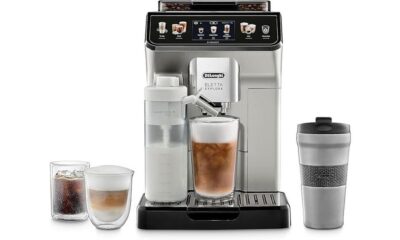
 Espresso Machines Reviews2 weeks ago
Espresso Machines Reviews2 weeks agoDeLonghi Eletta Explore: A Comprehensive Review [2025]
-

 Espresso Machines Reviews3 weeks ago
Espresso Machines Reviews3 weeks agoILAVIE 20 Bar Espresso Machine Review (2025)
-

 Espresso Machines Reviews3 weeks ago
Espresso Machines Reviews3 weeks agoSUMSATY Espresso Machine Review (2025)
-
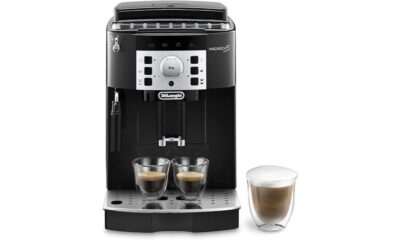
 Espresso Machines Reviews2 weeks ago
Espresso Machines Reviews2 weeks agoDeLonghi Magnifica S ECAM22.110.B Review: A Coffee Lover's Dream [2025]
-
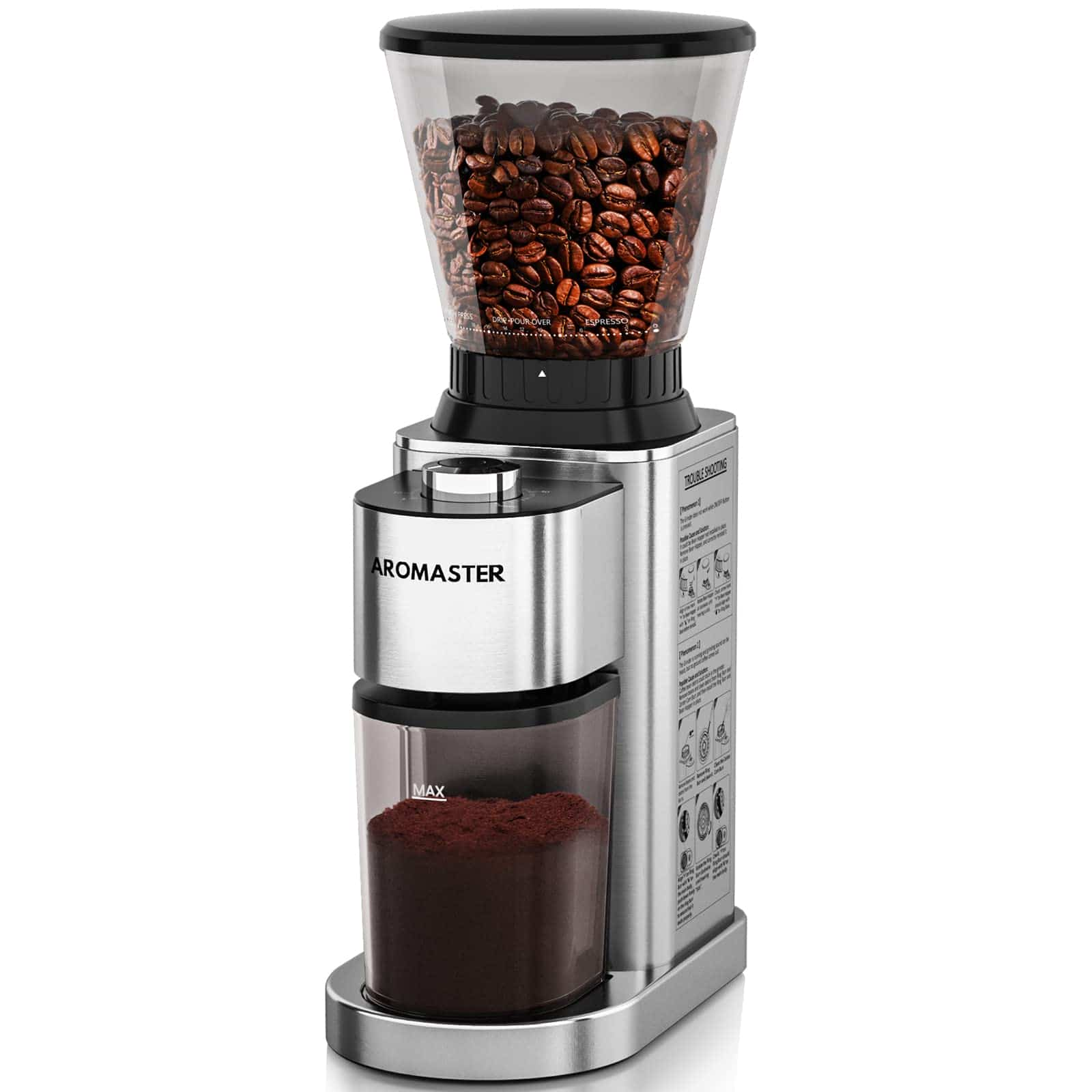
 Coffee Grinders Reviews3 weeks ago
Coffee Grinders Reviews3 weeks agoAromaster Burr Coffee Grinder Review (2025)
-

 Espresso Machines Reviews3 weeks ago
Espresso Machines Reviews3 weeks agoMAttinata Espresso Machine Review (2025)
-
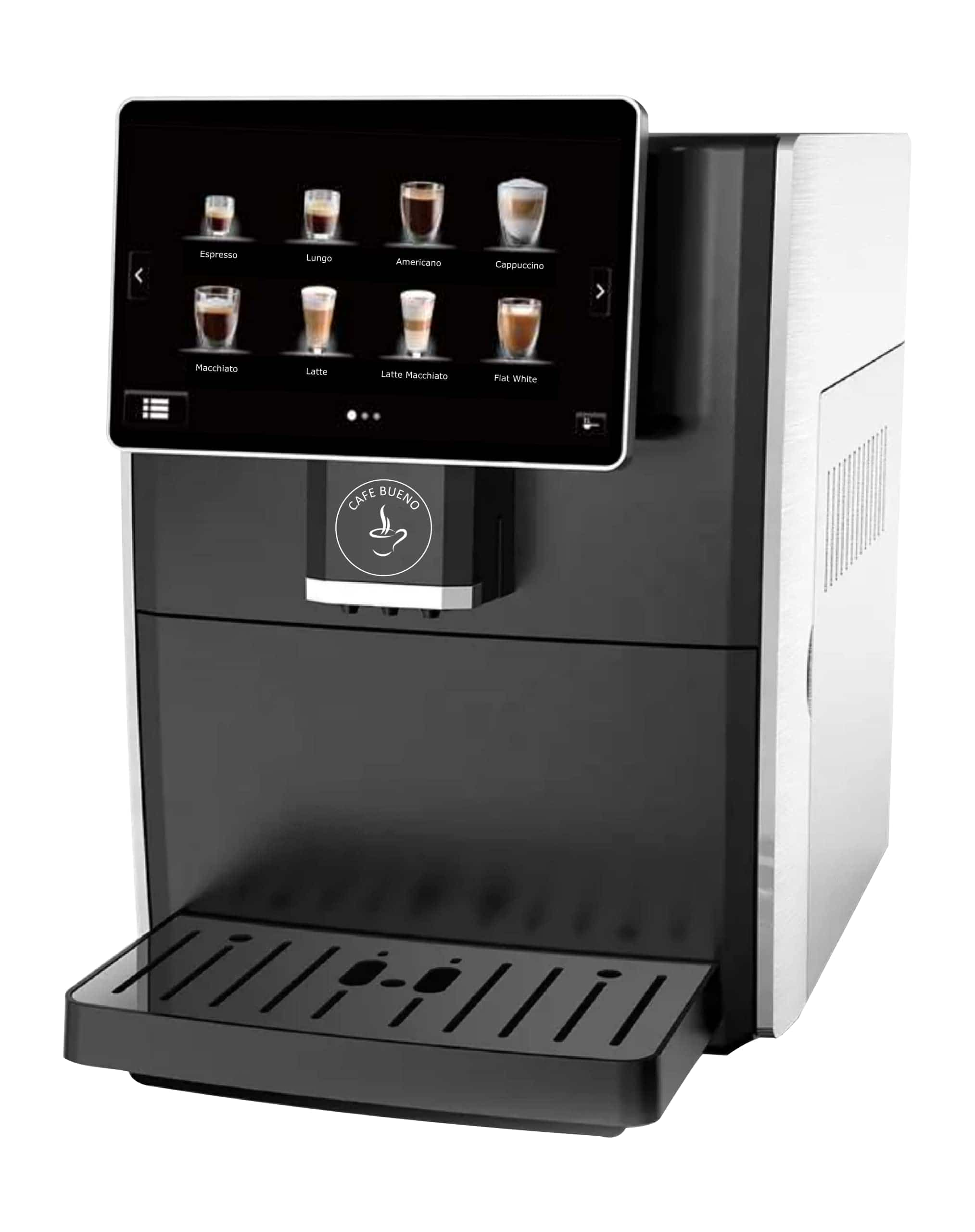
 Espresso Machines Reviews3 weeks ago
Espresso Machines Reviews3 weeks agoCafe Bueno Super Automatic Espresso Machine Review (2025)
-
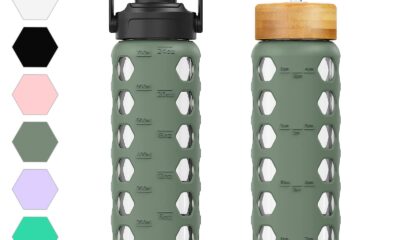
 Cappuccino Oracle Selected Reviews3 weeks ago
Cappuccino Oracle Selected Reviews3 weeks agoBest Glass Water Bottles for Eco-Friendly Hydration [2025]







